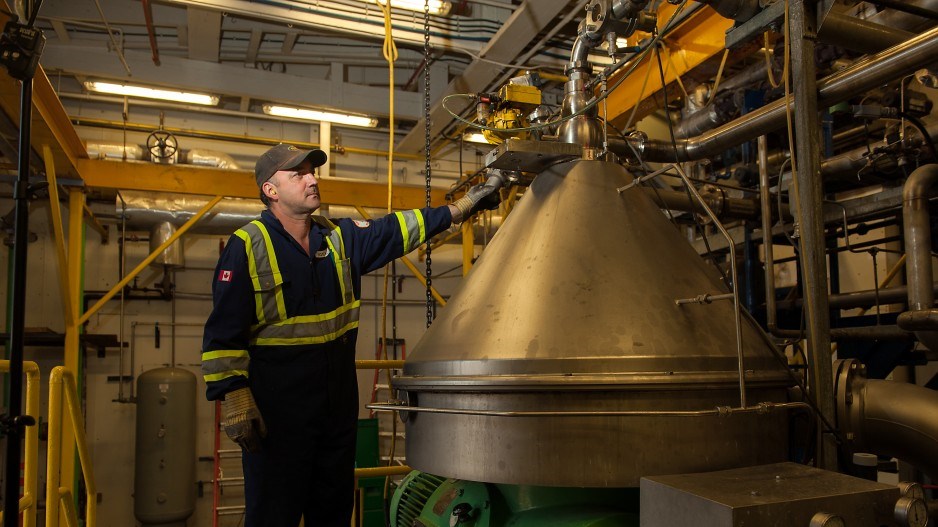If you pay a visit to West Coast Reduction Ltd.’s flagship shipping and processing operation at the Port of Vancouver, you’ll be struck by the sheer size of its bulk storage tanks, some of which stand 10 stories tall.
Strategically situated at tidewater and fed by nearby rail access, those massive storage tanks are vital infrastructure for connecting prairie-farmed canola oil to growing international markets.
Exports of so-called ‘liquid gold’ are poised to increase dramatically in the near term.
West Coast Reduction moves more than a billion dollars’ worth of canola oil through its Port of Vancouver facility to countries that include China, South Korea, Japan, Chile and Mexico. To break that down, they handle 50 per cent of the country’s canola oil exports to Asian Pacific markets, and 20 per cent of the nation’s canola oil exports bound for other international destinations.
West Coast Reduction also does much more than just ship agricultural exports.
For more than 50 years, the company has been taking by-products from the food manufacturing and agricultural industry and turning that material into high-quality ingredients for products ranging from pet food and livestock feed to soaps, lubricants and detergents.
And, as an independent company, West Coast Reduction is able to provide those core services to anyone in the agriculture or food services business that needs them.
“We provide critical infrastructure that allows Canadian farmers to access international markets,” says Jared Girman, director of government relations and strategic initiatives at West Coast Reduction.
“Along with canola, we also liquid-based organic oils such as tallow. Without us, those growers would have difficulty getting their product to market in an efficient, reliable way.”
Established in 1964, West Coast Reduction’s strategic Port of Vancouver operation has significant rail, storage and deep-water vessel capabilities – allowing it to receive, process and ship a range of commodities at a single, integrated location. The company’s 83,000-metric-tonne tank farm handles canola oil, kosher canola oil and vegetable oils, plus renewable biofuel feedstock that is in growing demand by manufacturers worldwide. They charge for storage and handling, but don’t broker or sell the canola.
The company employs 130 people in Vancouver who help collect and process 250,000 metric tons of organic material, each year.
West Coast Reduction also plays an essential role in managing used cooking oil for the food sector. Its retail brand Redux recycles tonnes of pre consumer food waste and by-products, and keeps all that cooking oil, grease, and fats from being discarded in an environmentally-irresponsible manner.
Redux safely recycles millions of litres of used cooking oil every year – material that could clog sewer systems, pollute waterways, and contaminate landfills if not properly handled and processed.
Redux’s dispatch program ensures used cooking oil gets picked up on a timely, reliable schedule. It also supports the food service sector by providing durable containers, locks, and keys to store used cooking oil between pick-ups.
It has the capacity to collect non-hydrogenated vegetable oils that stay liquid and are often used for deep-frying. The oils can be collected with a vacuum pump, along with solidified fat and grease drippings.
Once the oil is taken to West Coast Reduction’s Port facility, it gets tested to make sure it’s free of chemical contamination, sterilized in special tanks and run through a high-speed centrifuge to remove food solids and sediment. The end result gets re-purposed as an ingredient in both feed and biodiesel production.
Plus, it offers grease-trap cleaning services at competitive prices.
Redux takes the collected material to the closest facility, where fat, oil, and grease are separated from the water, which is then treated and re-used in industrial processes.
West Coast Reduction recently began collecting food waste from other forms of food production, including off-products from the bakery industry such as excess dough and flour that is no longer consumable. Those products are then re-purposed into animal feed ingredients.
“Our core mission is Nothing Left Behind,” Girman says. “We look to find value where others don’t see it. We’ve been a critical organics recycler since before recycling was fashionable. And we’re always looking for new ways to support our region’s circular economy.”
West Coast Reduction also operates in Saskatoon, Edmonton, Calgary, Lethbridge, and Nanaimo – providing a necessary service to farms, feedlots, restaurants, supermarkets and processors of beef, pork, poultry, and fish across Western Canada.
“No other facility in the Pacific Northwest has our capacity, and we’re looking to double it in the next few years.”




